#like to fucking homer?????
Text
Fun fact about the underworld saga:
‘558 men who died under your command’ from The Underworld, combined with ‘43 left under your command’ from Ruthlessness, doesn’t add up to 600 men.
Which means that the guy who fell off Circe’s roof and died is canon to Epic the musical.
Edit: it’s confirmed!
#for context in Homer’s odyssey there was a guy who got really drunk and fell asleep on Circe’s roof the day before they were meant to leave#and when he woke up he forgot he was on the roof of the palace and fell off#and as such broke his neck and died#epic the underworld saga#epic the musical#what the fuck a thousand notes???#I love how many people in the notes are like ‘rip elpenor’ or ‘ELPENOR MENTION‼️‼️’#1k#2k
2K notes
·
View notes
Text
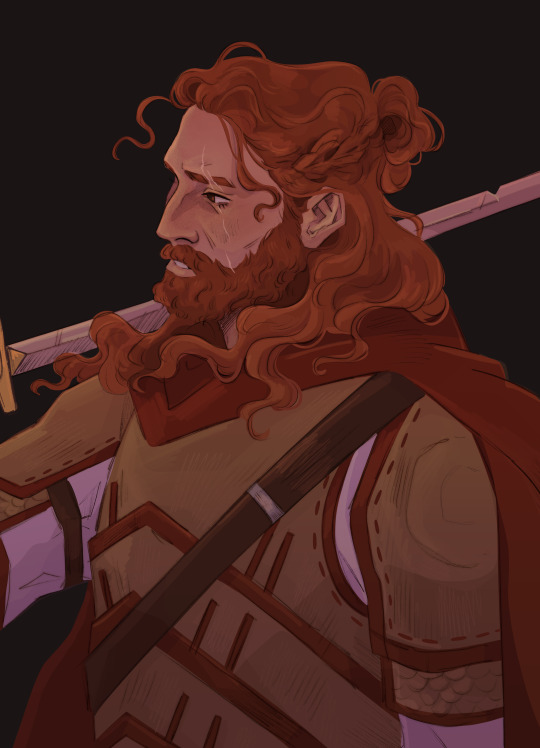
Long hair won out in the end rip all the short haired Menelaus truthers
Art used as reference from littleulvar on twitter: https://twitter.com/littleulvar https://twitter.com/littleulvar/status/1210636583713591296
#His hair is looking ORANGE#Homer like his hair is auburn :/ it’s auburn if u reduce the saturation smh#He turned out weirdly viking esque?? I think it’s the braided hair ??#Majestic if I do say so myself#Menelaus#greek mythology art#my art#the Iliad#trojan war#Greek myth#a#Also an ATTEMPT was made at Bronze Age armour#I don’t know if my reference was reliable#fuck it we ball
4K notes
·
View notes
Text
Circe, Witch of Aiaia
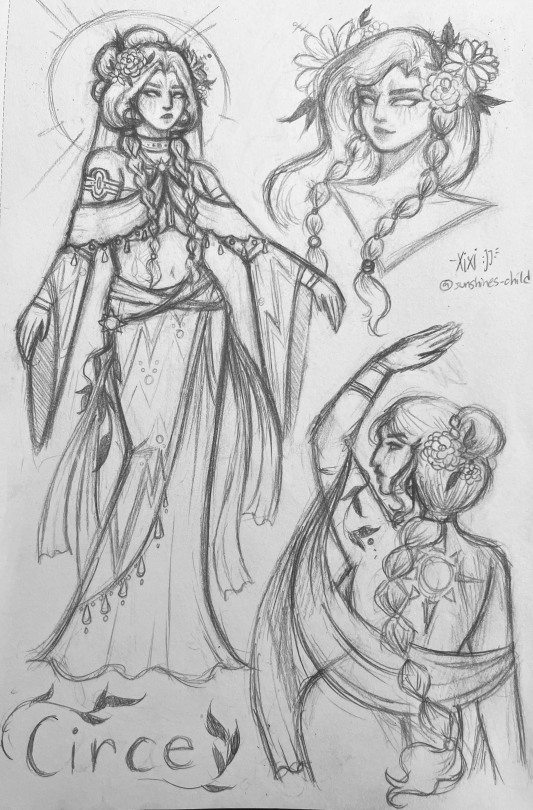
I have drawn Circe so many times and i've finally settle on a design that is largely different but I like a lot
#on that note who the fuck thought Aiaia was a good name#it sounds like an asian parent when they look at your report car and see an A-#aiyahh repeated twice#like what were they doing#"I've created this cool character she's a witch and she's part of Odysseussy's journey!#okay Homer where does she live?#Uhhh Aiaiaiaiiaiaiaiaiaia#Oh Aiaia? Smart#...yeah#epic the circe saga#odyseussy#circe#circe saga#epic the musical#odysseus#the odyssey
540 notes
·
View notes
Text
Hi. I'm cyberbullying a long dead poet because of his shitty fanfic. Enjoy. I'd love it if you joined me.
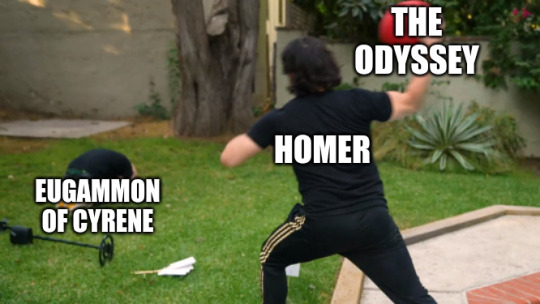
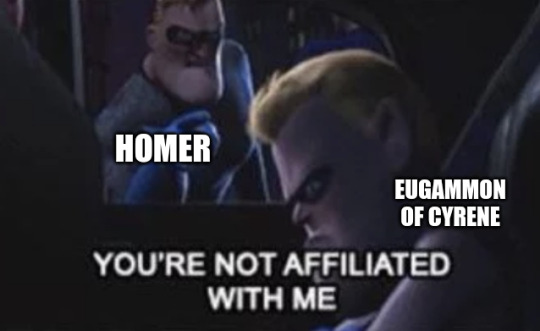



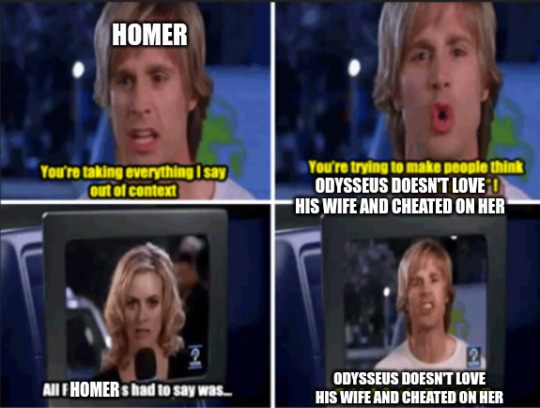

(Before you get mad at me, yes, I know Eugammon of Cyrene is an important figure and all that. I'm sick with some sort of flu. Let me cyberbully an ancient dead fanfic writer in peace.)
#I think my favorite is the astronaut one lol#because I wanna see Homer fed up and just start taking people out.#Also Penelope not putting up with some little shit.#You know what? I'm gonna be a bitch to people who bring up Telegonus to me and be like “Oh? You mean Polites' son?👁👁”#just to fuck with people >:)#Can you imagine how confused and mad people would get at me??? I love it.#Eris threw the Golden Apple into Thetis' and Peleus' wedding and I threw this shit into tumblr#guys I'm on weird flu medicine aaaaaaaaaaaaaaaaa#I have not slept much because of it🙃#Mad rambles#am I funny yet?#shot by odysseus#anti circe#anti madeline miller#Tele-GONE-y#odysseus#penelope#odyssey#the odyssey#tagamemnon#greek mythology#odypen#greek myth memes
155 notes
·
View notes
Text
many thoughts about epic: the musical...
i am once again in the middle of essay writing but plautus is boring and my friend introduced me to this album so u already know I binged the entire thing
(quick warning for spoilers of homer's odyssey? if that's necessary?? man idk whatever)
first thoughts naturally concerned odysseus. i have hated this man with a burning passion ever since I started studying classics - i think he is irredeemably selfish, a liar masquerading as a 'resourceful hero,' and basically just a twat all around. that being said, i respect that epic is not an exact replica. in fact, i like that about it!
readings of odysseus as a loving husband and father, and a man who cares deeply for his crew and fellow warriors is one i would love to see reflected in the source text (though i admit i have only read two different translations so far, so this is subject to change depending on translators choice!), if only because it would be so so refreshing. and epic does that extremely well! i find epic's odysseus to be far more likeable, insofar as he is fueled not by greed for glory (kleos for the nerds out there) but rather the desire to return to his wife and son. (I personally would argue that, while homer's odysseus is indeed fueled by a desire for homecoming (nostos), it is not for the sake of penelope and telemachus, but rather concern over the security of his status and position within the household (oikos))
i also very much enjoy that the love he holds for his family is not an inherently positive trait. in the aeneid, and often in myth, it is achilles' son, neoptolemus/pyrrhus who kills the son of hector and andromache, astyanax by throwing him from the walls of troy - less common, it is odysseus (which i did not know until i googled it just now oops). homer's odysseus does not reject the gods. he is beloved by some, hated by others - he receives their boons and curses as they come. he revels in the attention of the divine, no matter positive or negative, for it is proof of his kleos. epic's odysseus is so much more... human. he doesn't vie for glory that reaches the skies. if anything, he rues it. in the horse and the infant he supplicates himself to (who i assume is) zeus - which is such a loaded act i am genuinely struggling to think of how to articulate it, but boy am I gonna try my darndest.
the act of supplication and guest-friendship (xenia) is a very key theme within the odyssey, and to a point in the iliad also - essentially, if a traveller were to arrive at your doorstep, you were obliged to let them in and provide food, drink, and lodgings to that traveller, no questions asked. in return (because reciprocity is VERY important in homer especially), the guest would provide entertainment, tales of their travels, etc, and would be respectful of their host. the patron of these travellers was zeus. any violation of these terms, on part of the guest or host, would be met with divine scorn. for odysseus to supplicate himself to zeus is therefore meta as hell, but I would instead bring attention to the echoing lyric "hes bringing you down to your knees." 'he,' assumedly, is astyanax. his father, hector, is dead; as is his grandfather, priam, and all of priam's other sons. at this point, one could assume that it is astyanax who is ruling troy, who is now the host of the city that odysseus, a traveller from another land, has entered and ransacked. zeus' 'prophecy' of astyanax growing old and seeking revenge (reciprocity! homeric greece had a 'revenge culture' - essentially 'an eye for an eye' as well as 'you scratch my back, I'll scratch yours,' though not always so clear-cut), therefore, would be odysseus' punishment for violating the terms of xenia.
supplication, however, is not limited to guest-friendship alone. for example, in odyssey 22, when odysseus slaughters the suitors occupying his home (is that spoilers?), their priest leodes supplicates himself at odysseus' feet, begging to be spared. odysseus takes his head from his neck in an instant. odysseus' kneeling before astyanax, therefore, is no simple act between a guest and his host - perhaps he is begging the infant for mercy, for forgiveness, or perhaps he is positioning himself for punishment; in killing astyanax, odysseus accepts his own death. perhaps this means his fate (which, in case of homeric epic, refers to the time and manner of one's death), or perhaps it is a part of him that has died. in just a man, odysseus asks "when does a man become a monster?" his killing astyanax prevents the boy from ever becoming a man, and spares him from a life fueled only by revenge and the need to regain his glorious birthright, and it turns him into a monster. just as he says he would, he trades in the world where he is 'just a man' for a world where he is a cruel beast, all for sake of his family.
(quick detour but i really like how odysseus' focus is primarily on penelope rather than telemachus. [insert deadbeat dad joke here], but in reality, he doesn't even know the boy. penelope he chose to marry and fall in love with - it's no question that he loves telemachus, but after ten years, it is only natural that he would miss his beautiful, tricky wife with more fervour than the child he never had the chance to love. it shows he is imperfect, even illogical - the son is the father's entire legacy. just as odysseus is 'son of laertes', so will telemachus be 'son of odysseus', the protector of his immortal heroic legacy. yet it is penelope whom odysseus yearns for.)
(another detour but "i'm just a man" is such a juicy lyric, because the entire message of homer's odyssey is that odysseus is not any man - he is a man that the muses deem worthy to inspire great poets to compose epic poems that persist through thousands of years and a million different voices - a hero. but epic's odysseus is not that hero. he is a man, trying to go home, craving comfort and the warmth of the hearth. these 'flaws' humanise him more than homer's odysseus could ever imagine.)
skipping over to polyphemus, odysseus violates xenia once again by killing polyphemus' sheep, albeit unwittingly. homer makes this violation very obvious - odysseus and crew eat polyphemus' cheese and wine while polyphemus tends to his sheep, knowing that the cave is obviously inhabited, and they even wait for polyphemus to return to ask for more. it is worth noting as well that, at this point, odysseus and crew are still jubilant about their victory, and unlike in epic, these 'detours' are purposeful, specifically so that odysseus can scope out the islands for anything of interest he can snatch and add to his spoils of war, adding to his kleos by means of physical wealth (timē) - which makes odysseus' offer of treasure to appease polyphemus all the more baffling in epic. this odysseus is a leader who prioritises the lives of his men over his own kleos, which makes the final lines - "you shall be the final man to die" // "what?" // "watch out!" - all the more heartbreaking. he wants to protect his men, so that they too may return to their families back on ithaca; the prospect of watching them die before his eyes after he already witnessed so many lose their lives in battle must be so utterly terrifying.
polyphemus is so excellently creepy as well! i loved him in the odyssey - this was where I really started to dislike odysseus, actually. he's a cyclops, obviously inhuman, yet he rears sheep and makes cheese and wine and weaves wicker baskets to keep them in, trying to play at humanity. i really did sympathise with him from the first time I read it. epic's polyphemus is similar, so very calm in his anger yet ruthless all the same, and demonstrates great restraint in comparison to his counterpart in the odyssey, who gets filthy drunk after mashing six men dead and allows odysseus+co. to fashion a stake with which to blind him. much of the violence against polyphemus, as well as the violation of xenia in homer's odyssey is 'excused' by the fact that polyphemus is a 'barbarian', to whom concepts of civilised people do not belong.
(very quick detour but polyphemus' first admonishment of odysseus - "you killed my sheep" up to "take from you like you took from me" - makes such heartbreaking parallels to astyanax's murder and the sack of troy. it almost provides a visualisation of the guilt that odysseus must still be battling. i would have loved to have been in his brain when he heard polyphemus say that.)
the mercy odysseus shows polyphemus is particularly interesting - homer's odysseus leaves him alive and tells him his name purely so that his name will spread and his kleos will grow. but epic's odysseus, despite his conviction to kill in survive and to avenge is fallen comrades in remember them, spares him. in part, this is to assure them an escape, so that the cyclops' giant body does not block their exit - but athena's interruption makes clear that this is not all. she criticises him, remarks "he is still a threat until he's dead." no doubt this calls back to zeus' warnings about astyanax, hence his refusal (or inability?) to commit to slaughter. for a homeric greek hero to allow a foe to live on after his allies had been slaughtered is a grave failure of reciprocity, casting shame on both the hero and their enemy. homer's odysseus escapes this with his reputation intact, since as a result polyphemus curses him to face poseidon's wrath - as I mentioned, for a hero, even negative attention from the gods is a good thing as it proves that their reputation/glory is known all over, even in olympus. but, as we have established, epic's odysseus cares not for kleos. the decision to tell polyphemus his name is entirely impulsive and irrational, grieving his comrades, hence athena's outrage.
the relationship between athena and odysseus is founded entirely on the principles they share, described in warrior of the mind (if anyone can lmk whereabouts this song fits in the timeline I will be so grateful, I'm stupid unfortunately :/). they value wisdom, reason, and rationality over brute strength and bloodlust. epic's athena becomes odysseus' patron goddess with the goal to "make a greater tomorrow" and "change the world" - aspirations that are entirely foreign to any homeric god. gods in homer do not care about the wellbeing of humans unless they are directly related to them, and they certainly don't care about the wellness of humanity as a whole. humans are toys and tools of the gods. the amount that athena cares for odysseus, even in the odyssey, is unusual, demonstrative of how much she cares for him, yet epic makes their comradery more obvious, even going as far as to (tentatively) call them friends. my goodbye frames athena's anger as disappointment at an experiment failed - calling back to warrior of the mind, where she claims to have "designed" him - but odysseus' replies to her makes clear that it is far more personal. perhaps, to her, odysseus acting so irrationally is even a betrayal; odysseus is abandoning the principles of reason they both once held and thus is forsaking all that they once shared and that she, as the goddess of wisdom, stands for.
ive always considered athena to be a very interesting goddess. she is a patron of both war, which in homer is only carried out by men, and weaving, the traditional work of women within the household - her very nature is a contradiction of masculine and feminine. although it is ares who is considered the 'black sheep' of the olympians for his brutality in war, epic's portrayal of athena through odysseus' lens paints her as lonely and ostracised - "since you claim you're so much wiser // why's your life spent all alone? // you're alone." It is clear that odysseus here does not view her as his patron at all, rather as a friend - and to that she takes offence, because she is a goddess, eternal and all-powerful. she does not need friendship or comradery; those are mortal concerns alone. personally, I see epic's athena as incredibly insecure. she cuts odysseus off because she cannot bare that a mortal has been able to read her so clearly, to see all the ugly parts of herself that she keeps hidden to retain the facade of the perfect goddess. she knows the paradox within herself - warrior and woman, immortal and alone - and rues that odysseus was able to see it as well. the cruellest part, the most ironic, is that his being able to figure out the true, imperfect nature of a god shows that he has not abandoned the path of the warrior of the mind. in fact, his wisdom extends beyond mortality into the realm of the divine. but athena is blinded by her anger and insecurity, and she says her goodbyes. she disappears from there, only to appear again to try to warn odysseus of his crew opening the bag of winds given to him by aeolus in keep your friends close, once again demonstrating her care for him, despite her anger.
the amount that odysseus cares for his crew is demonstrated time and again throughout the album, yet in the end, he still slowly loses their trust. aeolus' winds are the first sign. his crew betrays his orders upon the first whisper on the wind that he might be keeping treasure from them. the next sign, in puppeteer, is eurylochus' confession upon arrival to aeaea (circe's island), which odysseus brushes off, much as he brushed off eurylochus' concerns in luck runs out. then, in a matter of moments, 600 men are reduced to forty by the wrath of poseidon - which in itself is a significant change. while odysseus in epic is explicitly blamed for failing to kill polyphemus, homer's odysseus takes no responsibility for the deaths of hundreds of his men. it happens when they arrive at telepylos, which, unbeknownst to them, is home to the laestrygonians, a race of cannibalistic giants. odysseus, apparently sensing something off (who tf does he think he is, spiderman?), allows his entire fleet to enter the bay of telepylos while his ship alone remains outside - and when those ships are attacked and trapped, he alone takes his single ship and escapes, allowing twelve ships of men to be ripped apart and eaten by cannibals. an act which he shows no remorse for.
in my interpretation of homer's odyssey, it is this slowly slipping trust that eventually leads to his men ignoring his warnings and feasting on the cows of helios which leads to the deaths of all his remaining crew, including eurylochus and polites (spoilers? idk). so, once epic: the musical catches up to book 12 of the odyssey you WILL be seeing me again I hope ur excited.
there is definitely more i could say here, especially about the circe saga bcs ohhh my god I love circe and I love this circe especially (a female character with actual motive other than being a victim? homer could never) but unfortunately I'm running out of steam and I do in fact have 3 essays due this month (help) so I will probably return to this later !! hopefully its readable bcs I'm not going back to edit any of this ;)
#joined cort's spotify jam while writing this and got rickrolled#the message here is trust no one#skipped my seminar to do work and did this instead#fuck u plautus and your dumb menaechmi#this took like 4 hrs to write i have issues#epic the musical#epic the ocean saga#epic the circe saga#epic the cyclops saga#epic the troy saga#epic#classics#classical studies#homer's iliad#homer's odyssey#the odyssey#odysseus#penelope#media analysis#literary analysis#longpost#homer
83 notes
·
View notes
Text
i hate that people think that achilles wanted patroclus and his ashes mingled together because they were just besties like no-
if me and my bestie died like you best be putting us in serparate graveyards or lemme tell you those spirits are getting pissed at us man.
#patrochilles#patroclus#the song of achilles#tsoa#achilles#remember that one time achilels wanted their ashes to be together#the iliad#homer#homo#theyre actually gay#historians be like: theyre just great friends#like hell no they were fucking man
62 notes
·
View notes
Note
Can I ask you about the scene with Priam?
Before this Achilles is not “sleeping,” bathing, eating, or drinking as part of his mourning process. We see him holding Patroclus’ body, a no-no as the body is “unclean.” (Also, he shaves his head, rolls in dirt, passes out in dirt, etc.) I have seen some takes about how this is part of Achilles’ mourning process for both Pat and himself and how this is him sort of losing the rest of his humanity. Then just-just prior to the Priam scene, Thetis goes to Achilles to tell him to give Priam Hector’s body. Achilles just gives in without any resistance. This is around line 130. She’s like, ‘baby you got to move on from this. Go have something to eat and fuck a woman’ (some of the phrasing here is curious, but it’s not exactly the focus of my question). I always thought this quick acceptance to see Priam was a sign of his deep depression and resignation to his fate.
But then in the scene with Priam he plays proper host. He’s eating and drinking. Then he (debatable imo) goes off to fuck Briseis. It’s like he is literally doing what his mother told him to do. So why the switch from rejecting human customs and needs to engaging in “normal” behavior? As you mentioned, these old stories function differently and don’t exactly have characters arcs with lessons learned. So like wtf is going on? What are we supposed to do with this information?
No disrespect here, but sometimes I think these reversal scenes (which happen multiple times) are just one of Homer’s co-authors/editors going off and doing their own thing and there’s really no hidden meaning at all.
Okay so first of all, I think the notion of Homer's "editors" tampering with the text is a fairly popular one in some circles, I have heard a few different versions of it and I'm not sure I agree or disagree. Most classicists whose work I've read so far, and who work predominantly with Homer, tend to take the Iliad and Odyssey at face value and to automatically assume that the works are the way Homer/whoever wrote them intended them to be. And this is the way I myself engage with the Homeric works, because I think once you go "oh that part here is nonsense, it has probably been changed by those nebulous editors" then you're so much more likely to pick and choose what you like and draw your own conclusions and I don’t think that's fair to the work and the extensive body of work dealing with that work. Ykwim? So let's just say that the Iliad as a whole, and the part you highlighted in particular, are in the fact the way the original epic is meant to be.
The last few books of the Iliad, in my opinion, are the breakdown of Achilles' character. In the beginning, despite his anger and resentment towards Agamemnon, we still see him put together and civil with everyone during the embassy scene, and then again when he speaks with Patroclus, arms him and sends him forth to fight. Then, after Patroclus dies, he loses the plot and goes on his rampage, where his grace, respect and courtesy even towards his enemies fly right out the window. Even after he kills Hector and drags him around, he finds no peace. He refuses to eat, drink or bathe and still yearns and cries for Patroclus. But then, after he sees Patroclus' shade at the beach, is where the second most important change comes about if you ask me; this is when Achilles seems to wholeheartedly accept his death. We have Patroclus' funeral, then the funeral games, where Achilles seems to once again find his nobility and grace, as well as showcase how adept he is at diplomacy and handling the other warchiefs' pettiness and arrogance. Even with Agamemnon he is generous and polite, not exhibiting any resentment towards him.
But there's something different about that scene compared to all the others imo: there is not much of the energy, fire and determination we would see earlier, even when he was grieving. He gives away so much of his treasure too; my friend Baejax and I have often talked about this scene and how it feels like Achilles is giving away his wealth because he has no need for it, since he'll be dying soon anyway. This is a man that has fully accepted that hard behind glory rides death, and that it will be coming swiftly for him.
And this is how I've always seen the meeting with Priam, tbh. For me personally, that scene has always been about grief, mortality and the cost of glory (which is the most important commodity in the Iliad universe) and a meditation on the suffering which unites mankind. Achilles talks about his homeland and the father he has left behind whom he will never again see, about the pain he has caused Priam and his people, about the gods and the ultimate lack of choice that humans have. Men must suffer, he says, and must make others suffer in a world without justice.
So for me it isn’t so much Achilles embracing again the human customs he had rejected, but instead fully acknowledging the reality of his position and resigning himself to it. I don't think that Achilles "plays" the host, so much as he extends his hospitality to Priam (which, again, very important ideal in the Iliad, it's where the Trojan war started in a way. With Paris violating the Achaean's hospitality and stealing Helen), acknowledges Priam's suffering, and acknowledges how instrumental he has been in said suffering. In that scene, killer and victim become one, and with the insight into each other’s condition comes compassion. And I think that's a powerful statement, and perhaps the most enduring in the Iliad. Soon after that, the Trojans bury Hector, which foreshadows and mirrors' Achilles' funeral as well. This "double funeral" completes the Iliad, and its overarching tragedy.
Now. The thing is that Achilles is a really divisive personality to begin with, and the scene with Priam even more so. He isn’t easy to categorise or analyse, and depending on the lens through which one sees his actions and behaviours, the interpretation could change greatly. Rachel Bespaloff in her commentary On the Iliad (which I absolutely loathe and want to tear in little pieces and burn LOL) says that "to rid himself of troublesome responsibility Achilles ducks behind fatality" during the Priam scene, and that his words to the old king are "scandalous behaviour". If you ask me, this take completely ignores Achilles' own suffering and rejects his role in the Iliad as the idealistic, honourable and rigid in his honour and beliefs young hero who almost completely loses his humanity BECAUSE of the ugliness and pettiness of war, because of that suffering, because of his own grief, because of injustice, because of bad leadership, because violence simply begets violence. And it also completely ignores the larger and overarching idea in the Iliad that death and glory, suffering and good fortune go hand in hand. And that this doesn't only apply to good and noble Priam and Hector, but also (you guessed it) to Achilles, in this final scene which is a moment of shared humanity between "enemies" and one of the most poignant in the epic.
Anyway. To conclude this tangent, no, I do not believe that Achilles simply does what his momma tells him to do, nor does he wine and dine Priam for the hell of it. I believe that this is the most depressed, resigned and desolate we see Achilles in the entire poem, a man simply awaiting his death with nothing really to look forward to in life, but who still retains his humanity and treats the people around him with the dignity and respect they deserve.
I hope this answered your question!
#achilles#the iliad#Homer's iliad#listen i just want to chase takes like bespaloff's with a baseball bat until they stop existing#no book has ever managed to raise my blood pressure but this managed it beautifully#thank god a lot of analyses I read these days seem to directly oppose it#anyway it's super fucking late and i'm barely coherent i should go to bed#patrochilles#Patroclus#priam
41 notes
·
View notes
Text
Astarion Name Meaning
Ancient Greek
ἀστήρ (astḗr) -- meaning "star"*.
There are a few different possible configurations regarding "-ion" in Ancient Greek, but only two that work in this context:
-ίον (-íon) -- A noun-forming diminutive suffix, indicating smallness. In this case it would mean "Little/Small Star" giving us ἀστήρίον
-ῑ́ων (-ī́ōn) -- patronymic suffix meaning "son of". In this case it would mean "son of [the] Star". As -ῑ́ων is primarily an Epic suffix, the meaning could be extended as poetic to mean "Son of [the] Stars". Which gives us ἀστήρῑ́ων
*(Likely from Proto-Indo-European *h₂e(h₁)s- meaning to burn/to glow, ultimately from the root *h₂eh₁- which was found on Palaic tablets)
#will do some more of these#because I like etymology#Also this is in ancient greek because no latin suffixes would work correctly here#I think both are pretty fun meanings but I prefer son of the stars. Especially given its homeric twist#Particularly because hes a moon elf (;#Oh holy fuck I just got deja-ve#baldur's gate 3#astarion ancunin#astarion#bg3#astarion headcanons#astarion hc#snailpaste: thoughts#bg3:astarion
39 notes
·
View notes
Text
I love the exchanges between Hector and Paris that go like
Hector: You swaggering, beautiful bag of trash. You ruinous, empty-headed, luscious-haired dynasty destroyer. Shame of our family. Boon to our enemies. Destroyer of Troy. So gorgeous and cowardly and craven and lustful. You will be the death of us all.
Paris: lmao 💯💯💯💯 read for filth 😩👌
#tagamemnon#the iliad#another one of troy the movie's crimes#is fucking making them be in a loving brotherhood situation#and not actual siblings who are seconds away from throttling each other#well Hector is there Paris is like lmao he won't do it I'm baby#the only true depiction of siblings in history#anyway I was looking for inspiration from homer on finding an insult for Paris
52 notes
·
View notes
Text
I love Uncle Rick. He's a great dude (I think lol). But I will NEVER forgive him for how he wrote Achilles in The Last Olympian. If you know, you know.
#... a large chest#a fine mouth#and powerfully formed arms and legs. His head was covered with long wavy chestnut-colored hair. Though mild in manner#he was very fierce in battle. His face showed the joy of a man richly endowed.#achilles#WITH SHORT HAIR!?!?!?#SHORT BLACK HAIR!?!?!?!#THE FUCK#In the account of Dares the Phrygian#Achilles was described having#homer just says xanthos and purros/pyrrus(??)#which is just “shining” and “fiery/red”#so achilles was a ginger basically#with long hair because achilles with short hair makes no fucking sense T-T#i don't even like the achilliad that much but like...#come on rick?#the last olympian#percy jackon and the olympians#pjo books#percy jackson#the iliad#trojan war#uncle rick#rick riordan#pjo
47 notes
·
View notes
Text
Me,a starstruck 15 year old reading the Odyssey for the first time : *sighs* wish I was born in 12th century BCE so I could see Troy and-
The fucking Sea people: BRING US THE GODDAMN WARSHIPS
#pLEASE#the sea people theory haunts me in my dreams#keeps me up at night#their origins are highly disputed and we can never put exactly where they emerged from but they wrecked HAVOC#towards the end of the bronze age#egypt under ramses iii was only able to defend itself theres an entire depiction of the battle that was found#they basically destoryed so many major cities including troy#we know this becuase theres a layer of charcoal in thr ruins of troy#when you think about it actually#its very easy to see how homer wrote the illiad and odyssey#because he grew up during the dark ages of 400 years where he was surrounded by these ruins#and he was like “fuck it might as well write a fanfic”#okay#i will shut up#homer#the illiad#the odyssey#bronze age civilisation#12th century bc#sea people theory#and vampy ranting about history
60 notes
·
View notes
Text
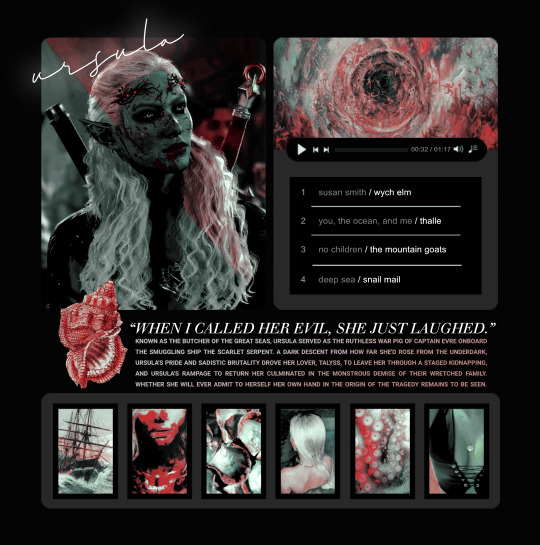
𝐔𝐑𝐒𝐔𝐋𝐀. ┆ 𝗕𝗔𝗦𝗧𝗔𝗥𝗗 𝗖𝗛𝗜𝗟𝗗, 𝗞𝗥𝗔𝗞𝗘𝗡-𝗦𝗟𝗔𝗬𝗘𝗥, 𝗕𝗨𝗧𝗖𝗛𝗘𝗥 𝗢𝗙 𝗧𝗛𝗘 𝗚𝗥𝗘𝗔𝗧 𝗦𝗘𝗔𝗦.
𝐜𝐡𝐚𝐨𝐭𝐢𝐜 𝐧𝐞𝐮𝐭𝐫𝐚𝐥 ┆ 𝐬𝐚𝐢𝐥𝐨𝐫 ┆ 𝐬𝐞𝐥𝐝𝐚𝐫𝐢𝐧𝐞 𝐝𝐫𝐨𝐰 ┆ ♡ 𝐚𝐬𝐭𝐚𝐫𝐢𝐨𝐧
"Let me say it plain: I loved someone and I failed at it. Let me say it another way: I like to call myself wound but I will answer to knife."
#okay i am mildly proud this time !! i’ve come so far with coloring methinks !!#will not stop having my little baldur's gate 3 moment..... we are fucking down down down by the river !!#bg3#edit*#ch: ursula#blood tw.#also will NEVER stop using that nicole homer quote for ursa. like jesus christ.#you the ocean and me is one of my favorite songs ever btw. it's so ursula/taylss core u don't even understand.#almost included sunlight by hozier for a lil ursula/astarion moment bc of their recurring sun imagery (makes me moan and throw up <3)#but deep sea works for like a MILLION different things relating to ursula and talyss AND astarion so i used that one instead#anyways. teehee.#real ones will recognize i've changed a few details abt talyss' 'betrayal' + killed off the crew in the time since i last posted abt it ✊#it just works better !!
86 notes
·
View notes
Text
It's awful when I'm on the job and an elderly person asks me for help bending over/picking something up especially when they ask so nicely.. I haven't been able to find a polite way to refuse. It's hard being the designated young person when you're invisibly disabled
#wrenfea.exe#bc i don't really use mobility aids in the field other than my walking sticks#and i didnt have them today#usually my coworker steps in but he wasnt here today#my back is still pretty fucked up and i cant really bend over or lift things quite yet#its also the same thing with having to give your seat up on the bus#even though you need it bc everyone around you assumes you dont#had an old lady just stand and glare at me and didnt even say anything when i asked if she wanted the seat#when i tried to explain i need to sit she just stepped closer and stared down at me it was fucking weird#like the homer simpson meme#chronic disability#chronic pain#spoonie#fibromyalgia#disability#from the field#working while disabled#invisible disability
85 notes
·
View notes
Text
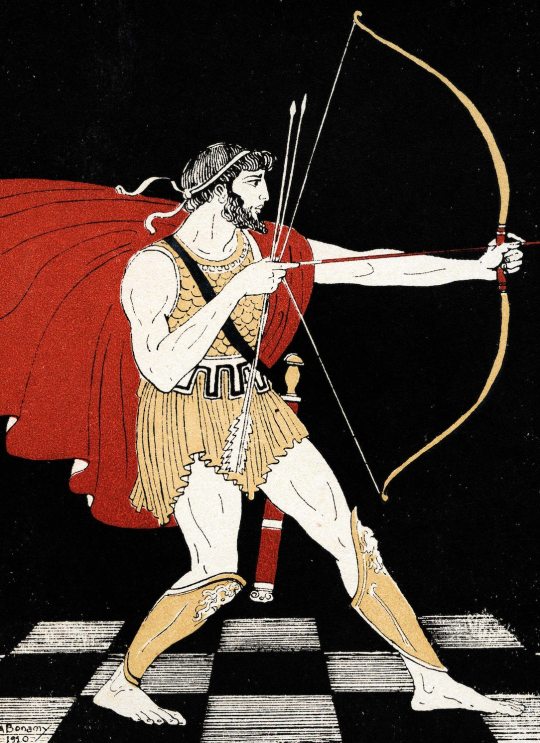
Today's daily male is Odysseus of Ithaca from The Odyssey!
for anonymous!
#daily male#odysseus#ithaca#the odyssey#greek myth#greek mythology#homer#men#masculinity#mod howl#fuck this dude I once wrote an essay about how much I hate when people call him a hero#but also I do really like the odyssey#he's way better in the Iliad
28 notes
·
View notes
Text
Ares is the only Olympian in the Iliad who isn't Within The Narrative Playing a Role he's just doing his job
#the Iliad#everyone is so mean to him and its so fucking funny mostly because hes just like IM LITERALLY JUST HANGING OUT#homer#classics#tagamemnon
164 notes
·
View notes
Text
So in the Odyssey we found out Nestor has a daughter called Polycaste who he allows to bathe Telemachus and in some versions of post-Odyssey life the two of them are married, which implies that she is either of age with or younger than Telemachus. Telemachus is as old as how long Odysseus has been gone; 20 years. So Polycaste was either just a baby like Telemachus when their fathers set off to Troy, or (and personally I find this possibility more interesting) Nestor's wife was pregnant with her when he left.
And like, imagine you're Nestor and you're finally returning home after ten years of war and are probably dreading having to tell your wife that one of your sons died at Troy. And you come home and find out you now have a 9-10-year-old daughter who probably doesn't even know who the fuck you are or any emotional connection to the brother she lost. Not to mention that those two brothers who went to war were probably old enough to be fathers themselves so she may very well be an aunt to children fairly close in age to herself. Like can you imagine how awkward and uncomfortable that would have to have been for all parties involved?
And then Telemachus just comes along years later looking for info on his dad and Nestor just decides to play matchmaker.
There isn't really a point to all this. I just felt like rambling about Classics again.
#greek myth#greek mythology#homer#the odyssey#the iliad#nestor#telemachus#polycaste#like sometimes i just think about how much time all the men in the Achaean army lost even if it wasn't for twenty years like odysseus#their kids literally grew up without them#who knows how many of them had kids born just months after they left that just spent the first decade or their lives without a father#i just imagine these kids being very confused#and just thinking “why the fuck is this dude in our house and why does he keep wanting me to call him dad?”
48 notes
·
View notes